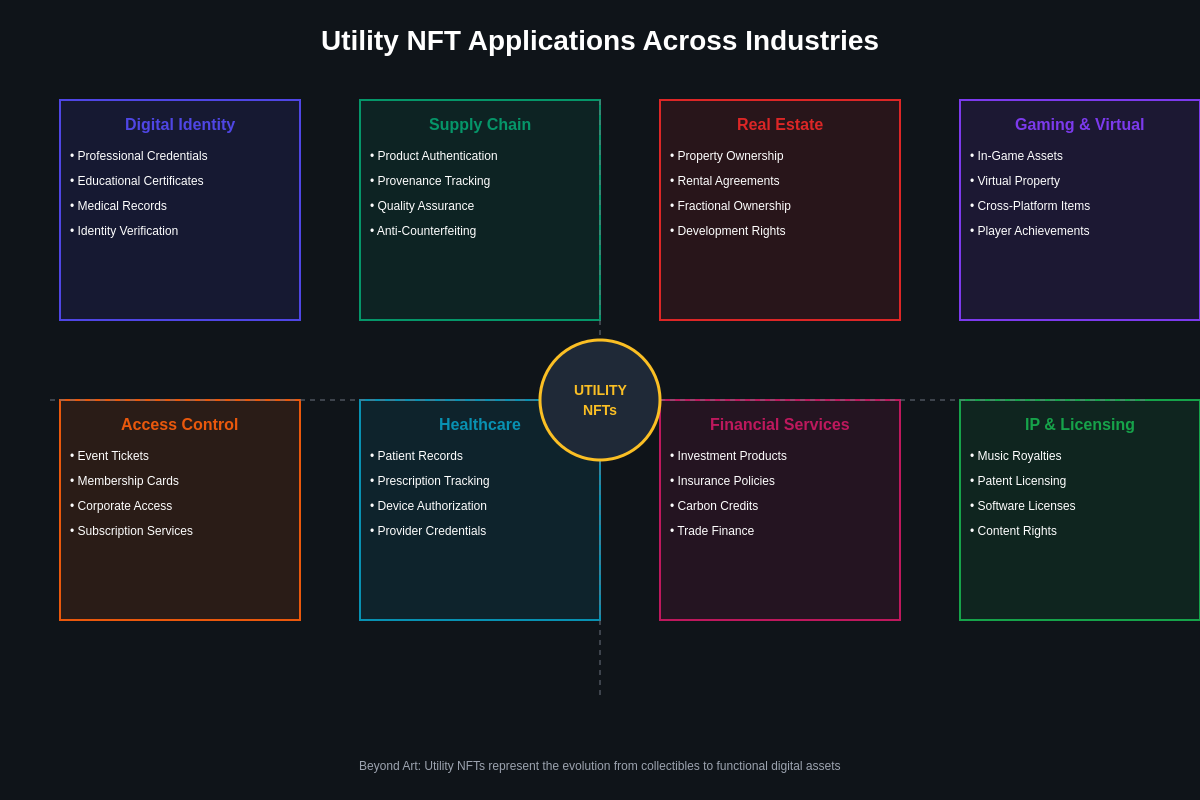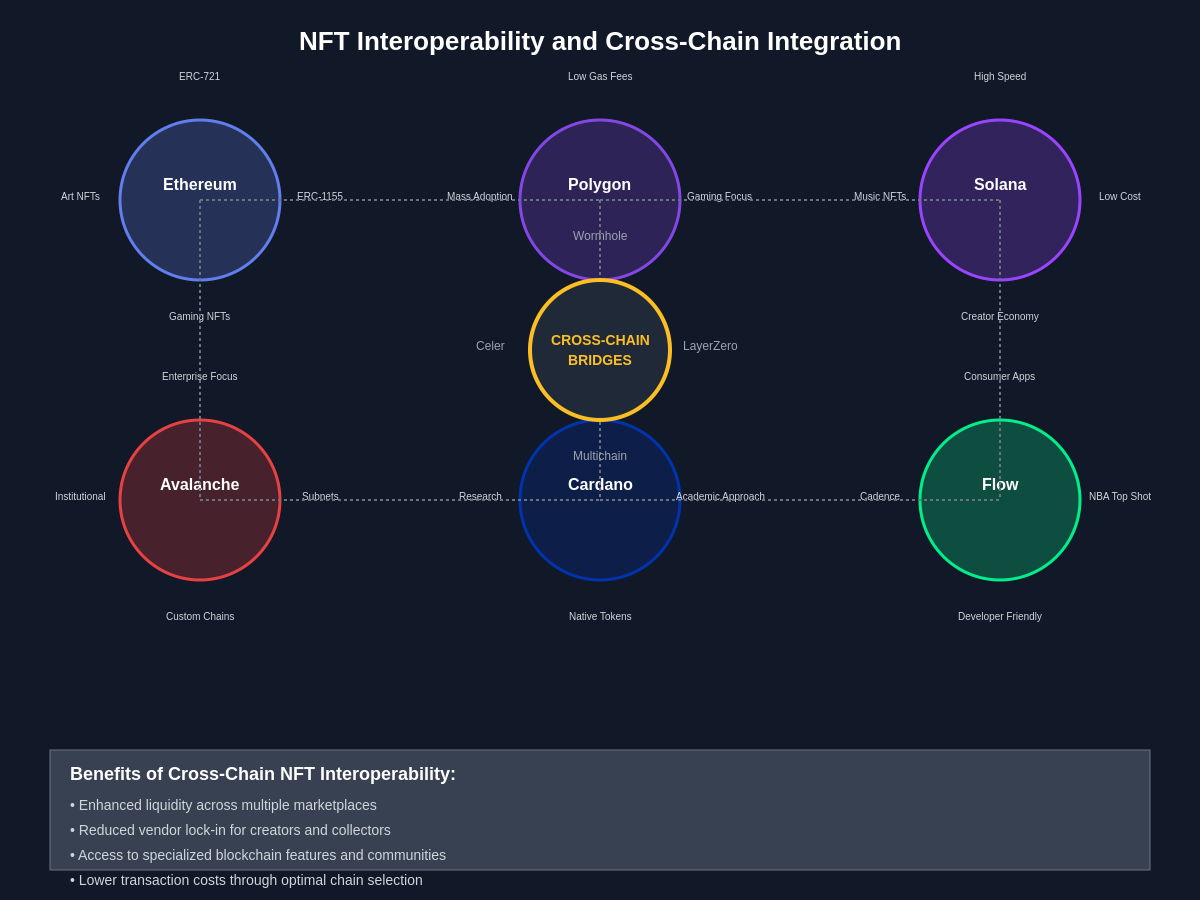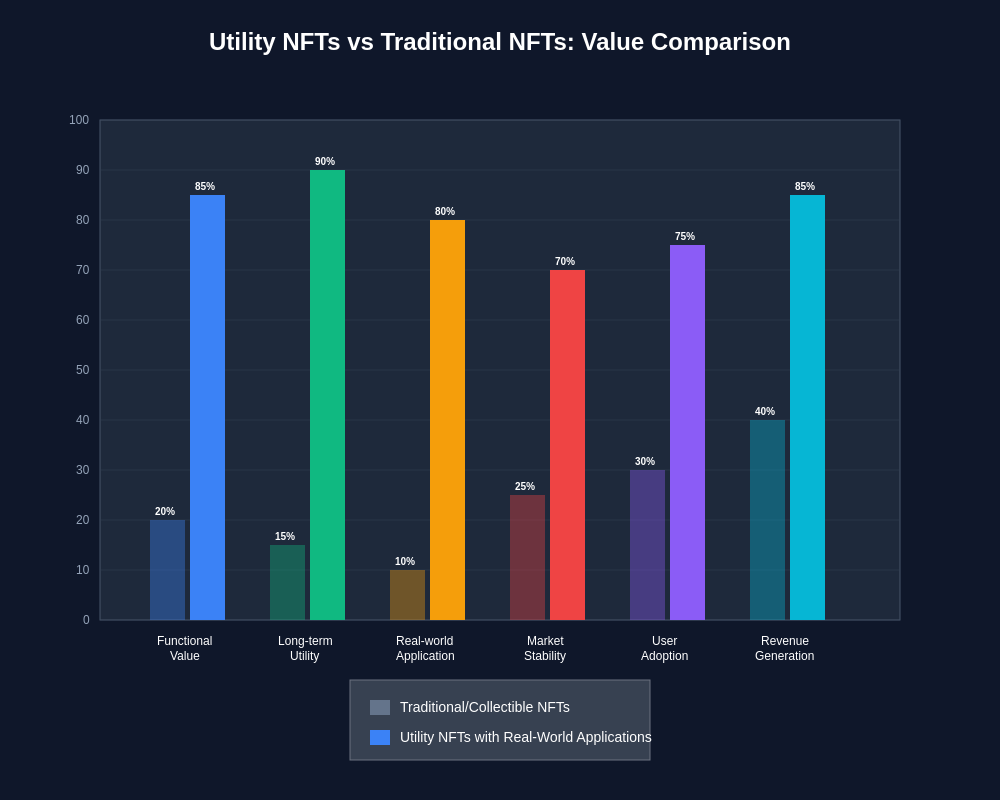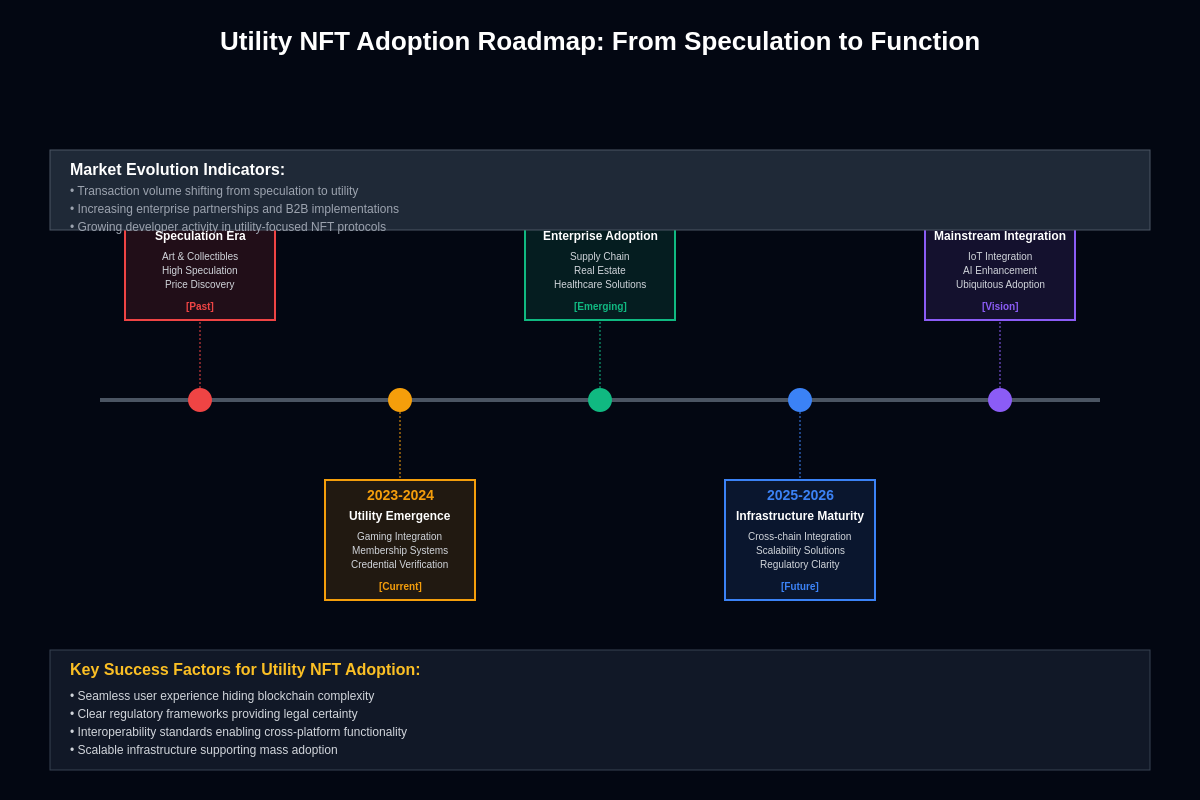The evolution of Non-Fungible Tokens (NFTs) has transcended the initial focus on digital art and collectibles to embrace a vast array of practical applications that are revolutionizing how we interact with digital ownership, identity verification, and access control across numerous industries. While the public perception of NFTs remains largely tied to expensive digital artwork and speculative trading, the underlying technology has matured into a powerful tool for creating verifiable digital scarcity and programmable ownership that extends far beyond aesthetic appreciation into genuine utility-driven use cases that solve real-world problems.
Access TradingView’s comprehensive NFT and blockchain analysis tools to explore the intersection of traditional markets and emerging NFT technologies.
The Foundation of Utility-Driven NFTs
Utility NFTs represent a fundamental shift from speculative digital collectibles to functional digital assets that provide tangible benefits, access rights, or services to their holders. Unlike traditional art-focused NFTs whose value derives primarily from aesthetic appeal, rarity, or social status, utility NFTs derive their worth from the practical functions they enable, making them more akin to digital keys, certificates, or membership cards that unlock specific benefits in both digital and physical environments.

The blockchain infrastructure supporting utility NFTs provides unprecedented transparency, immutability, and interoperability that traditional digital certificates and access systems cannot match. Smart contract functionality enables these tokens to automatically execute predetermined actions based on ownership verification, creating seamless user experiences that eliminate intermediaries and reduce friction in various processes from event ticketing to supply chain verification.
The programmable nature of utility NFTs allows for sophisticated conditional logic that can adapt to changing circumstances, time-based restrictions, and complex multi-party interactions. This flexibility enables developers to create dynamic utility systems that can evolve over time, automatically update access permissions, or trigger various actions based on external data sources, making them suitable for applications ranging from subscription services to complex financial instruments.
Digital Identity and Credential Verification
One of the most promising applications of utility NFTs lies in digital identity management and credential verification, where the immutable nature of blockchain technology provides a robust foundation for creating tamper-proof digital certificates that can be instantly verified by any party without relying on centralized authorities. Educational institutions, professional organizations, and certification bodies are increasingly exploring NFT-based credentials that provide graduates and professionals with portable, verifiable proof of their qualifications that cannot be forged or misrepresented.
Professional licensing bodies have begun implementing NFT-based systems that allow licensed practitioners to prove their credentials across jurisdictions without requiring complex verification processes that traditionally involve lengthy correspondence between licensing authorities. Medical professionals, lawyers, engineers, and other licensed practitioners can maintain portable digital credentials that automatically update with continuing education requirements and can be instantly verified by employers, clients, or regulatory bodies.
The healthcare industry presents particularly compelling use cases for NFT-based identity verification, where patient records, medical certifications, and treatment authorizations can be securely stored and selectively shared while maintaining patient privacy and regulatory compliance. Medical professionals can use NFT-based credentials to prove their qualifications across different healthcare systems, while patients can control access to their medical information through programmable NFT-based permissions that automatically expire or update based on treatment needs.
Academic credentials stored as NFTs eliminate the need for complex transcript verification processes while enabling educational institutions to maintain permanent records that cannot be lost or altered. Students can share their verified educational achievements with potential employers, other educational institutions, or professional organizations without requiring direct verification from their alma mater, streamlining application processes while maintaining the integrity of educational credentials.
Supply Chain Management and Product Authentication
The integration of NFTs into supply chain management systems addresses critical issues of product authenticity, provenance tracking, and quality assurance that have plagued global commerce for decades. Luxury goods manufacturers have embraced NFT-based authentication systems that create immutable digital certificates for high-value items, enabling consumers to verify authenticity throughout the product lifecycle while providing manufacturers with powerful tools to combat counterfeiting and gray market distribution.
Monitor luxury goods and commodity market trends with TradingView’s advanced charting capabilities to understand how NFT authentication impacts market dynamics.
Pharmaceutical companies are implementing NFT-based tracking systems that create detailed audit trails for medications from manufacturing through distribution to end consumers, addressing critical safety concerns related to counterfeit drugs while enabling rapid response to safety issues through precise tracking of affected product batches. These systems provide regulators with unprecedented visibility into pharmaceutical supply chains while giving healthcare providers and patients confidence in medication authenticity.
Food safety applications of NFT technology enable comprehensive tracking of agricultural products from farm to table, providing consumers with detailed information about growing conditions, processing methods, and transportation history while enabling rapid identification and isolation of contaminated products during food safety incidents. Organic certification, fair trade verification, and sustainable sourcing claims can be permanently recorded and verified through NFT-based systems that eliminate the possibility of fraudulent labeling.
Automotive manufacturers are exploring NFT-based vehicle history systems that create comprehensive digital records of manufacturing specifications, maintenance history, accident reports, and ownership transfers that remain permanently associated with each vehicle. These systems address significant issues in the used car market where vehicle history information is often incomplete, inaccurate, or intentionally concealed by sellers seeking to maximize sale prices.
Real Estate and Property Rights
The real estate industry represents one of the most significant opportunities for NFT adoption, where property ownership records, rental agreements, and development rights can be tokenized to create more efficient, transparent, and accessible property markets. Traditional real estate transactions involve complex legal processes, multiple intermediaries, and significant delays that NFT-based systems can streamline while maintaining all necessary legal protections and regulatory compliance.
Fractional real estate ownership through NFTs enables broader participation in property investment by allowing multiple parties to own shares of high-value properties that would otherwise be inaccessible to individual investors. These systems automatically distribute rental income, manage voting rights for property decisions, and facilitate the sale of ownership shares without requiring complex legal restructuring or expensive intermediary services.
Property development rights and zoning permits can be tokenized as NFTs that automatically transfer with property ownership while maintaining detailed records of approved uses, development restrictions, and regulatory compliance requirements. This approach eliminates confusion about property rights while enabling more efficient transfer of development opportunities between property owners and developers.
Rental agreements implemented as smart contracts linked to NFT-based access tokens can automate many aspects of property management including rent collection, security deposit handling, maintenance request processing, and lease renewal negotiations. Tenants can receive NFT-based access tokens that automatically update their permissions based on payment status and lease terms while providing landlords with transparent, automated management tools that reduce administrative overhead.
Commercial real estate applications extend to complex multi-tenant properties where different NFTs can represent various rights and obligations within the same property, from retail space leases to parking assignments to shared facility access. These systems enable sophisticated property management strategies while providing all parties with clear, verifiable records of their rights and responsibilities.
Gaming and Virtual Worlds
The gaming industry has emerged as a major driver of NFT adoption, where utility tokens represent in-game assets, character progression, access rights, and virtual property that retain value across different gaming platforms and virtual environments. Unlike traditional in-game purchases that remain locked within specific gaming ecosystems, NFT-based gaming assets can be traded, transferred, or utilized across multiple compatible games and platforms.

Virtual world economies built on NFT foundations enable player-owned economies where user-generated content, virtual real estate, and gaming achievements retain permanent value that can be monetized through various mechanisms. Players can earn significant income through skilled gameplay, content creation, or virtual property development while maintaining true ownership of their digital assets that cannot be arbitrarily revoked by game developers.
Cross-platform gaming integration through NFTs enables players to maintain consistent identities, achievements, and assets across multiple gaming environments while providing game developers with new monetization models that extend beyond traditional subscription or purchase-based systems. Character progression, rare items, and special abilities can follow players between compatible games while maintaining balance and fairness through sophisticated smart contract logic.
Esports applications of NFT technology include verified tournament results, player statistics, team memberships, and achievement records that create comprehensive professional gaming profiles that cannot be disputed or manipulated. Professional gaming organizations can use NFT-based contracts to manage player transfers, prize distributions, and sponsorship agreements while providing fans with verifiable collectibles tied to specific tournaments or player achievements.
Membership and Access Control Systems
Traditional membership systems across various industries are being transformed through NFT-based access control that provides more flexible, transparent, and interoperable membership experiences. Private clubs, professional organizations, and exclusive events can issue NFT-based memberships that automatically grant appropriate access levels while enabling secondary markets for membership transfers and temporary access arrangements.
Subscription services implemented through NFTs can provide more flexible payment models, transferable subscriptions, and automated access management that reduces administrative overhead while improving user experiences. Subscribers can pause, transfer, or modify their subscriptions through blockchain transactions while service providers maintain automated billing and access control systems that operate without manual intervention.
Corporate access control systems using NFT-based employee badges can provide sophisticated permission management that automatically updates based on role changes, project assignments, or employment status while maintaining detailed audit trails of facility access and system usage. These systems eliminate the need for manual badge management while providing enhanced security through cryptographic verification of access rights.
Explore membership economy trends and market analysis through TradingView’s comprehensive financial data to understand the evolving landscape of subscription and membership-based business models.
Event ticketing represents a particularly compelling use case for NFT-based access control, where tickets can include sophisticated anti-fraud measures, automated resale controls, and additional utility beyond simple event access. Event organizers can embed loyalty rewards, merchandise discounts, or future event priorities directly into ticket NFTs while maintaining complete control over ticket transfers and preventing unauthorized resales.
Intellectual Property and Licensing
The management of intellectual property rights through NFT systems addresses longstanding challenges in licensing, royalty distribution, and usage tracking that have historically required complex legal frameworks and expensive enforcement mechanisms. Content creators can tokenize their intellectual property rights to enable automated licensing agreements, transparent royalty distributions, and verifiable usage tracking across multiple platforms and distribution channels.
Music industry applications include NFT-based systems that automatically distribute royalties to songwriters, performers, producers, and other rights holders based on usage data from streaming platforms, radio stations, and live performances. These systems eliminate delays and disputes in royalty payments while providing complete transparency in revenue distribution that benefits all parties involved in music creation.
Patent licensing through NFT systems can streamline the complex process of technology licensing by enabling automated payment systems, usage tracking, and compliance monitoring that reduces the need for expensive legal oversight while providing patent holders with more efficient monetization of their intellectual property. Licensees benefit from transparent pricing and automated compliance verification that eliminates uncertainty about patent usage rights.
Software licensing represents another significant opportunity for NFT-based intellectual property management, where software licenses can be tokenized to enable secondary markets, automated compliance checking, and usage-based pricing models that benefit both software developers and users. Enterprise software deployments can be automatically managed through smart contracts that adjust licensing costs based on actual usage patterns.
Healthcare and Medical Records
Healthcare applications of NFT technology address critical challenges in medical record management, prescription tracking, and healthcare provider verification while maintaining strict privacy and regulatory compliance requirements. Patient-controlled medical records stored as NFTs enable individuals to selectively share medical information with healthcare providers while maintaining complete control over their personal health data.
Prescription NFTs can combat the opioid crisis and prescription fraud by creating immutable records of medication prescriptions that automatically prevent duplicate prescriptions, verify prescriber credentials, and track medication dispensing across different pharmacies and healthcare systems. These systems provide regulatory authorities with unprecedented visibility into prescription patterns while protecting patient privacy through sophisticated access controls.
Medical device authorization and recalls can be managed through NFT systems that maintain permanent records of device approvals, safety updates, and recall notices while enabling rapid identification of affected patients and healthcare providers. Medical device manufacturers can provide automated updates and safety notifications to device users while regulatory authorities maintain comprehensive oversight of device safety and effectiveness.
Healthcare provider credentials and certifications stored as NFTs enable instant verification of qualifications, specialty certifications, and malpractice history while providing patients with confidence in their healthcare providers’ qualifications. Hospital credentialing processes can be streamlined through automated verification of provider credentials while maintaining strict standards for patient safety and care quality.
Financial Services and Investment Products
The financial services industry is exploring numerous applications of NFT technology that extend far beyond simple collectibles to include sophisticated investment products, insurance policies, and financial instruments that leverage the unique properties of blockchain-based assets. Investment certificates, bond instruments, and derivative products can be tokenized as NFTs that enable fractional ownership, automated dividend distributions, and transparent secondary markets.
Insurance policies implemented as NFTs can provide automated claims processing, transparent policy terms, and portable coverage that follows policyholders across different providers and jurisdictions. Parametric insurance products can automatically trigger payouts based on verifiable external data sources while maintaining complete transparency in policy terms and claims processing.
Carbon credit trading through NFT systems addresses significant challenges in environmental markets by providing verifiable, tradeable certificates that represent specific environmental benefits while preventing double-counting and ensuring permanent retirement of used credits. Companies can demonstrate environmental compliance through transparent carbon credit purchases while environmental projects receive more efficient funding through streamlined carbon credit sales.
Trade finance applications include NFT-based letters of credit, shipping documents, and customs certificates that eliminate paper-based processes while maintaining all necessary legal protections and regulatory compliance. International trade transactions can be processed more efficiently through automated document verification and payment processing while reducing the risk of fraud and documentation errors.
Transportation and Logistics
Transportation industry applications of NFT technology include vehicle registration, maintenance records, and transportation credentials that create comprehensive audit trails for commercial and personal vehicles. Fleet management companies can maintain detailed records of vehicle usage, maintenance requirements, and driver assignments while regulatory authorities have access to transparent compliance information.
Shipping and logistics companies use NFT-based systems to track cargo movements, verify delivery confirmations, and manage complex multi-modal transportation arrangements that involve multiple carriers and jurisdictions. Customers receive verifiable proof of delivery while insurance companies have access to detailed shipping information that reduces fraud and streamlines claims processing.
Aviation industry applications include aircraft maintenance records, pilot certifications, and flight history documentation that ensure safety compliance while enabling efficient transfer of aircraft ownership and leasing arrangements. Regulatory authorities maintain comprehensive oversight of aviation safety while aircraft operators benefit from streamlined compliance processes and transparent maintenance histories.
Environmental and Sustainability Applications
Environmental monitoring and sustainability reporting through NFT systems provide verifiable proof of environmental impact, conservation efforts, and sustainability compliance that addresses growing demands for corporate environmental responsibility. Companies can demonstrate environmental commitments through transparent reporting while consumers make informed decisions based on verified sustainability information.
Renewable energy certificates and carbon offset verification through NFT systems ensure that environmental benefits are accurately measured, permanently recorded, and cannot be double-counted across different environmental programs. Energy producers receive fair compensation for environmental benefits while energy consumers have confidence in the environmental impact of their energy purchases.
Conservation project funding through NFT systems enables direct investment in environmental protection efforts while providing investors with verifiable proof of conservation impact and potential returns from sustainable resource management. Protected area management, species conservation, and habitat restoration projects can receive more efficient funding while providing transparent reporting of conservation outcomes.
Challenges and Technical Considerations
Despite the significant potential of utility NFTs, several technical and practical challenges must be addressed to enable widespread adoption across various industries. Scalability concerns related to blockchain transaction costs and processing speeds continue to limit the feasibility of high-volume NFT applications, particularly in industries that require rapid transaction processing or involve low-value transactions where blockchain fees become prohibitive.

Interoperability between different blockchain networks and NFT standards remains a significant challenge that limits the portability and utility of NFT-based systems. Cross-chain compatibility solutions are emerging but require additional complexity and technical expertise that may discourage adoption by organizations without sophisticated technical capabilities.
User experience challenges related to wallet management, private key security, and blockchain transaction complexity continue to create barriers for mainstream adoption of NFT-based systems. Organizations implementing utility NFTs must invest in user education and simplified interfaces that hide blockchain complexity while maintaining the security and transparency benefits of decentralized systems.
Regulatory compliance requirements vary significantly across jurisdictions, creating challenges for organizations implementing NFT systems that operate across multiple markets. Legal frameworks for NFT-based contracts, property rights, and financial instruments continue to evolve, creating uncertainty for organizations considering significant investments in NFT-based systems.
Future Outlook and Emerging Trends
The future of utility NFTs extends far beyond current applications to include integration with emerging technologies such as artificial intelligence, Internet of Things devices, and augmented reality systems that will create new categories of digital ownership and automated interactions. Smart city infrastructure, autonomous vehicle networks, and distributed energy systems will likely incorporate NFT-based identity and access control systems that enable seamless interactions between different technological systems.

Access TradingView’s futures markets and emerging technology analysis to explore investment opportunities in companies developing utility NFT applications.
Artificial intelligence integration with NFT systems will enable more sophisticated automated decision-making, predictive analytics, and personalized user experiences that adapt to individual preferences and behaviors. AI-powered NFT systems could automatically optimize access permissions, predict maintenance requirements, or identify potential security threats while maintaining the transparency and immutability benefits of blockchain technology.
Augmented reality and virtual reality integration with NFT systems will create new categories of digital ownership that bridge physical and virtual environments. Physical objects enhanced with AR capabilities through NFT-based authentication could provide interactive experiences while virtual objects in VR environments maintain persistent value and functionality across different virtual platforms.
The convergence of NFT technology with traditional financial systems will likely accelerate as regulatory frameworks mature and institutional adoption increases. Central bank digital currencies, corporate treasury management systems, and traditional investment products will increasingly incorporate NFT-based components that provide enhanced transparency, automation, and efficiency compared to legacy financial infrastructure.
Educational institutions and professional organizations will likely standardize on NFT-based credential systems that provide globally recognized, instantly verifiable proof of qualifications and achievements. This standardization will eliminate barriers to professional mobility while enabling more sophisticated skills-based matching between employers and workers across different industries and geographic regions.
Regulatory and Legal Framework Evolution
The regulatory landscape surrounding utility NFTs continues to evolve as governments and regulatory bodies work to balance innovation encouragement with consumer protection and market stability. Financial regulators are developing frameworks that distinguish between collectible NFTs and utility tokens that may qualify as securities or other regulated financial instruments, creating clarity for organizations developing NFT-based financial products.
Privacy regulations such as GDPR present unique challenges for NFT systems due to the immutable nature of blockchain technology and the “right to be forgotten” requirements that may conflict with permanent record-keeping. Organizations implementing utility NFTs must carefully design systems that comply with privacy regulations while maintaining the transparency and immutability benefits that make NFTs valuable for their intended applications.
Intellectual property laws are adapting to address the unique characteristics of NFT-based ownership, particularly regarding the distinction between owning an NFT and owning the underlying intellectual property rights associated with the NFT. Clear legal frameworks are essential for enabling widespread adoption of NFT-based intellectual property management systems.
Tax implications of utility NFT ownership, transfer, and usage continue to evolve as tax authorities develop guidance for different types of NFT transactions. Organizations implementing utility NFT systems must consider the tax implications for users while ensuring compliance with reporting requirements that may vary significantly across different jurisdictions.
The transformation of NFTs from speculative digital collectibles to practical utility tools represents a fundamental shift in how we think about digital ownership, access control, and value creation in the digital economy. As technical challenges are addressed and regulatory frameworks mature, utility NFTs will likely become integral components of numerous industries, providing enhanced transparency, efficiency, and user control compared to traditional centralized systems. The success of utility NFT implementations will ultimately depend on their ability to provide genuine value to users while maintaining the security, transparency, and decentralization principles that make blockchain technology valuable for these applications.
The continued evolution of utility NFT applications will be driven by the intersection of technological advancement, regulatory clarity, and market demand for more transparent, efficient, and user-controlled systems across various industries. Organizations that successfully implement utility NFT systems will likely gain competitive advantages through improved operational efficiency, enhanced customer experiences, and new revenue models that leverage the unique properties of blockchain-based digital assets.
Disclaimer: This article is for informational purposes only and does not constitute financial advice. Cryptocurrency and NFT investments carry significant risks, including potential loss of principal. The regulatory landscape for NFTs and blockchain technology continues to evolve and may impact the viability of various applications discussed. Readers should conduct their own research and consult with qualified professionals before making investment decisions or implementing NFT-based systems. Market conditions, technological developments, and regulatory changes may significantly affect the performance and adoption of utility NFT applications.